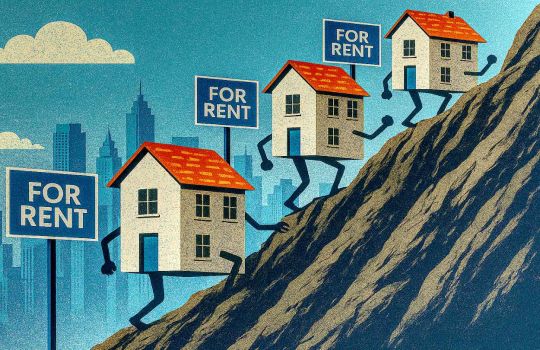The Rise of Big Money in London’s Rental Market

London’s rental market has long been shaped by a varied array of landlords - from retired couples letting out former family homes and buy-to-let investors managing a handful of mortgaged properties, to affluent individuals seeking returns on surplus capital, generationally inherited property owners, and overseas landlords. However, an increasingly influential player has been steadily gaining greater prominence in more recent times. They come equipped with significant financial resources and a strategic focus on large-scale acquisitions - and are poised to outcompete traditional investors and reshape the rental landscape.
They’re called institutional landlords - real estate funds, pension-backed companies, and build-to-rent giants. These organisations are buying, building, and managing entire blocks of rental homes across the capital. Their emergence is reshaping how - and how much - Londoners rent.
So, is this the dawn of a professionalised golden age for tenants? Or is it just gentrification wrapped in better branding?
Institutional initiatives
On paper, institutional landlords could offer a much-needed upgrade to the London rental experience.
Unlike small private landlords, who often manage properties as a side business, institutional players operate at scale. Think concierge desks, fitness rooms and responsive repairs.
Build-to-Rent (BtR) developments, which are purpose-built rental apartments with onsite management, have become a hallmark of this trend and, according to Centre for London, these properties typically offer higher management standards and a more professional rental experience for tenants.
There’s also the promise of more housing. With the capital crying out for homes, big investors can fund entire developments - sometimes hundreds of units at once. And because their returns are long-term, they’re perhaps more incentivised to maintain the buildings than a private landlord who might sell up in five years.
That said, the January 2025 edition of Who Lives in Build-to-Rent - a report by the business membership organisation BusinessLDN, the British Property Federation, PriceHubble, and the Association for Rental Living - noted that while completed Build-to-Rent (BtR) projects were up 13% in Q3 2024 compared to Q3 2023, the number of projects under construction had fallen by 11% over the same period. However, the overall BtR pipeline across the capital showed a year-on-year increase of 5%.
But what about the price tag?
Here’s the catch: it’s not cheap.
Studies show that build-to-rent homes in London cost, on average, 11% more than equivalent private rentals. That might buy you a gym, shared rooftop garden, and an app for reporting maintenance issues, but for many renters, especially key workers and young families, it’s still out of reach.
And while institutional landlords market themselves as providing stability, critics worry they’re pushing up rents across the board. With fewer affordable options, middle- and lower-income renters are squeezed even further.
Fading away or pushed out?
There’s another consequence of this shift - London’s once-dominant small landlords are leaving the stage.
Years of regulation - tax reforms, stricter lending rules, and now the proposed abolition of Section 21 “no-fault” evictions - have left many small-scale landlords feeling cornered. Some are choosing to sell. Who’s buying? Often, large investors hungry for scale.
It’s a kind of quiet consolidation. As individual properties change hands, the market shifts from diverse ownership to corporate control. “Landlord” stops being a person and becomes a portfolio.
Tougher on tenants?
The big risk is what this means for ordinary renters.
Yes, some may benefit from better-managed, more secure tenancies. But for others, the loss of affordable rentals - as small landlords exit and institutional players focus on mid- to high-end markets - means fewer options and tougher competition.
For lower-income renters, particularly those reliant on housing benefit or with poor credit histories, the future looks even more precarious. Corporate landlords are often more selective - and less flexible - than traditional ones.
So… is big bad?
Not necessarily. The professionalisation of renting can be a good thing. London’s private rental sector has long needed reform - too many tenants with tales of poor conditions, insecure leases, and unpredictable landlords.
But relying on corporate landlords alone to fix the market is a gamble. Without robust regulation and a focus on affordability, there’s a risk that renting in London becomes a polished, pricey service for the few, rather than a secure housing option for the many.
Structural shift
The rise of institutional landlords in London is neither villain nor saviour. It's a structural shift - part of a broader transformation of housing from a social good to an investment asset.
If London is serious about building a fair rental market, the question isn’t just who owns the homes - but who they’re really for - and who ultimately benefits?













